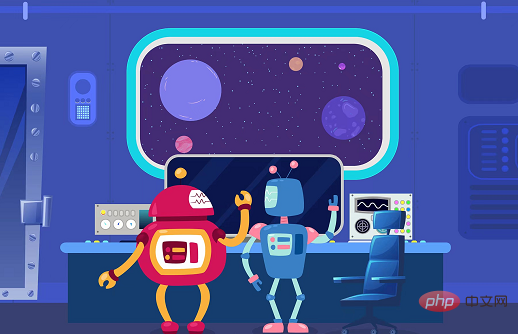Home >Technology peripherals >AI >Human intelligence VS artificial intelligence, which one is better?
Human intelligence VS artificial intelligence, which one is better?
- 王林forward
- 2023-04-09 13:01:081591browse

Artificial intelligence has the potential to surpass human intelligence in the near future. Despite huge advances in technology, artificial intelligence is still far from complete. The goal of human intelligence is to learn from experience and adapt to new environments through different cognitive processes, while the goal of artificial intelligence is to imitate and surpass human behavior.
How to measure human intelligence
Human intelligence can be measured through group tests or individual tests. It only takes a few minutes for most people to make a judgment about someone after meeting them.
Philosophers and psychologists have long debated how intelligence is conceptualized and measured, how many types of intelligence there are, the role of nature and nurture in intelligence, the social, biological and environmental determinants of intelligence, and how intelligence is represented in the brain.
In the early 20th century, Binet and Simon developed the first intelligence test - the "School Intelligence Test", which included a variety of questions such as naming objects, defining words, drawing pictures, completing sentences, The ability to compare items and form sentences.
IQ is widely used as an age-adjusted measure of intelligence.
IQ is an overall score derived from a set of standardized tests or subtests used to assess human intelligence.
The Stanford-Binet test is a measure of general intelligence that consists of a variety of tasks including vocabulary, picture memory, naming of familiar objects, repetition of sentences, and execution of commands.
The Wechsler Adult Intelligence Scale is the most widely used adult IQ test in the United States.
The most common IQ tests are:
- Stanford-Binet Intelligence Scale
- General Verbal Intelligence
- Differential Ability Scale
- Peabody Test of Individual Achievement
- Wechsler Personal Achievement Test
- Wechsler Adult Intelligence Scale
- Cognitive Impairment Woodcock Johnson III Test
People with IQs above 130 are often associated with high IQs. And a score below 70 usually causes concern. They may indicate an underlying learning disability.
There are three types of artificial intelligence:
Advances in artificial intelligence allow us to make progress in a variety of disciplines.
- Artificial Narrow Intelligence (ANI) has a limited range of capabilities.
- Artificial General Intelligence (AGI) has attributes comparable to human abilities.
- Artificial Super Intelligence (ASI), which has skills beyond humans.
How to measure intelligence in artificial intelligence
There are 4 main ways to measure intelligence in artificial intelligence systems:
Breadth:Most intelligent systems we know of, such as the human brain, have a wide range of capabilities. Children can learn many tasks such as walking, talking, etc. An AI system that should be considered intelligent should also have a similarly broad range of capabilities. AI systems should be able to learn any task without any modifications directly to their source code by human engineers. But we all know the "no free lunch" theorem, which is that an algorithm that is good at a specific task set will pay the price by performing poorly on other remaining task sets.
This means that with such a wide range of artificial intelligence systems, we need a set of basic learning algorithms, not just one. This is a very active area of research, and well-known groups like DeepMind are looking for such A set of general learning algorithms to address general artificial intelligence, which is a broader version of AI. In fact, this ability can definitely help us measure the intelligence of an AI system.
Data requirements: A powerful AI system should be able to model the problem from as little data as possible, but it should also be able to consume huge Google-scale data and make sense of it . The ability to generalize from little training data is a strong indicator of intelligence, as opposed to requiring large amounts of data to model a problem.
Supervised vs. Unsupervised: Obviously, we need both supervised and unsupervised learning in AI depending on the scope of application, but since there is more unlabeled data than labeled data around, Therefore unsupervised learning is more attractive. Unsupervised learning means intelligence because systems that learn autonomously with minimal supervision are considered more intelligent than other systems that require more supervision. This is very evident in human intelligence, where children who are able to complete tasks such as coding on their own are considered smarter.
Predictability: Artificial intelligence has the potential to surpass human intelligence in the near future. Despite huge advances in technology, artificial intelligence is still far from complete. The goal of human intelligence is to learn from experience and adapt to new environments through different cognitive processes, while the goal of artificial intelligence is to imitate and surpass human behavior.
The above is the detailed content of Human intelligence VS artificial intelligence, which one is better?. For more information, please follow other related articles on the PHP Chinese website!
Related articles
See more- Technology trends to watch in 2023
- How Artificial Intelligence is Bringing New Everyday Work to Data Center Teams
- Can artificial intelligence or automation solve the problem of low energy efficiency in buildings?
- OpenAI co-founder interviewed by Huang Renxun: GPT-4's reasoning capabilities have not yet reached expectations
- Microsoft's Bing surpasses Google in search traffic thanks to OpenAI technology

